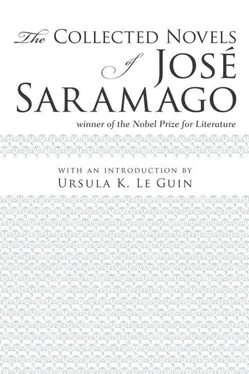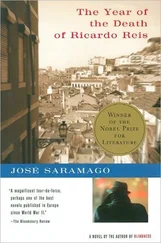Another example, which no doubt will be of greater profit to the soul since the body is so grossly over-fed, is to be given here today. The procession has commenced, the Dominicans in the vanguard carrying the banner of St Dominic, followed by the Inquisitors walking in a long file until the condemned appear, one hundred and four of them, as we have already stated, all carrying candles and with attendants at their sides, their prayers and mutterings rending the air, by the different hoods and sanbenitos you can tell who is to die and who will be sent into exile, although there is another sign, which never lies, namely that crucifix held on high with its back turned on the women who are to be burned at the stake and the gentle, suffering face of Christ turned toward those who will be spared, symbolic means of revealing to the condemned the fate that awaits them, should they have failed to understand the significance of the robes they are wearing, for these, too, are an unmistakable sign, the yellow sanbenito with the red cross of St Andrew is worn by those whose crimes do not warrant death, the one with the flames pointing downward, known as the upturned fire, is worn by those who have confessed their sins and may therefore be spared, while the dismal grey cassock bearing the image of a sinner encircled by demons and flames has become synonymous with damnation, and is worn by the two women who are to be burned at the stake. The sermon has been preached by Friar John of the Martyrs, the Franciscan provincial, and certainly no one could be more deserving of the task, considering that it was also a Franciscan friar whose virtue God rewarded by granting that the Queen should become pregnant, so profit from this sermon for the salvation of souls, just as the Portuguese dynasty and the Franciscan Order will profit from the assured succession and the promised convent.
The rabble hurls furious insults at the condemned, the women scream abuse as they lean from their window-sills, and the friars prattle amongst themselves, the procession is an enormous snake that cannot be accommodated in the Rossio in a straight line and is therefore forced to coil round and round, as if determined to reach everywhere and offer an edifying spectacle to the entire city, that fellow over there is Simeão de Oliveira, a man without profession or benefice, who claimed to be registered as a secular priest with the Holy Office of the Inquisition and therefore entitled to celebrate Mass and hear confessions and preach, yet who at the same time declared himself to be a heretic and a Jew, rarely has there been such a muddle and to make matters worse, he sometimes called himself Padre Teodoro Pereira de Sousa or Friar Manuel of the Holy Conception, at other times Belchior Carneiro or Manuel Lencastre, and who knows what other names he might have assumed, because every man ought to have the right to choose his own name and be able to change it a hundred times daily, for there is nothing in a name, and that fellow over there is Domingo Afonso Lagareiro, a native and an inhabitant of Portel who claimed to have visions in order to be revered as a saint and practised miraculous cures with blessings, invocations, signs of the cross, and other superstitions, and you can imagine how many impostors there have been before him, and that is Padre António Teixeira de Sousa from the Island of St George, who has been found guilty of soliciting women, a canonical phrase meaning that he fondled and sexually assaulted them, almost certainly by seducing them with words in the confessional, only to end up having furtive intercourse in the sacristy until he was caught, he will be exiled to Angola for life, and this is me, Sebastiana Maria de Jesus, one-quarter converted Jewess, and I have visions and revelations that the Tribunal has dismissed as fraudulent, I hear heavenly voices, but the judges insist they are the devil’s work, I believe that I might well be a saint just like all the other saints, or even better, for I can see no difference between them and me, but the judges rebuked me, accusing me of intolerable presumption, of monstrous pride, and of offending God, they told me that I am guilty of blasphemy, heresy, and evil pride, they have gagged me to silence my assertions, heresies, sacrileges, and they will punish me with a public flogging and eight years of exile in Angola, and having listened to the sentences they have passed on me and on others in the procession, I’ve heard no mention of my daughter, Blimunda, Where can she be, Where are you, Blimunda, if you were not arrested after me, you must have come here looking for your mother, and I shall see you if you are anywhere in the crowd, for only to see you do I want these eyes of mine, they have covered my mouth but not my eyes, ah, heart of mine, leap in my breast if Blimunda is out there, among that crowd that spits on me and throws melon skins and garbage, how they are deceived, I alone know that all may become saints if they so desire, but I am forbidden to cry out and tell them so, at last my heart has given me a sign, my heart has given a deep sigh, I am about to see Blimunda, I am about to see her, ah, there she is, Blimunda, Blimunda, Blimunda, my child, and she has seen me but cannot speak, she must pretend that she does not recognise me, or even pretend to despise me, a mother who is bewitched and excommunicated, although no more than a quarter Jewess and converted, she has seen me, and at her side is Padre Bartolomeu Lourenço, do not speak, Blimunda, just look at me with those eyes of yours, which have the power to see everything, but who can that tall stranger be who stands beside Blimunda and she does not know, alas, she does not know who he can be or where he comes from, whatever will become of them, why do my powers fail me, judging from his tattered clothes, that harrowed expression, that missing hand, he must be a soldier, farewell, Blimunda, for I shall see you no more, and Blimunda said to the priest, There is my mother, then, turning to the tall man standing beside her, she asked, What is your name, and the man spontaneously told her, thus acknowledging that this woman had a right to question him, Baltasar Mateus, otherwise known as Sete-Sóis.
Sebastiana Maria de Jesus had already passed, along with all the others who were sentenced and the procession came full circle, they whipped those who had been sentenced to a public flogging, and burnt the two women, one having been garrotted first, after she declared that she wanted to die in the Christian faith, while the other was roasted alive for refusing to recant even at the hour of death, in front of the bonfires men and women began to dance, the King withdrew, he saw, ate, and left, accompanied by the Infantes, and returned to the Palace in his coach drawn by six horses and escorted by the royal guard, evening is closing rapidly, but the heat is still oppressive, the heat of the sun is fierce, and the great walls of the Carmelite Convent cast their shadows over the Rossio, the corpses of the two women have fallen among the embers, where their remains will finally disintegrate and at nightfall their ashes will be scattered, not even on the Day of Final Judgment will they be resuscitated, the crowds begin to disperse and return to their homes, having had their faith renewed, and carrying gummed to the soles of their shoes some of the ashes and charred flesh, perhaps even clots of blood, unless the blood evaporated over the embers. Sunday is the Lord’s day, a trite observation since every day belongs to the Lord, and the days go on consuming us unless in the name of the same Lord the flames have consumed us more quickly, a double outrage, when with my own reason and will, I refused the aforesaid Lord my flesh and bones and the spirit that sustains my body, son of mine and of me, direct union with myself, the world descending over my hidden face, no different from my hooded face, therefore unknown. Yet we must die.
Читать дальше












